Subproject 5: H. pylori induced inflammatory microenvironments of the stomach lining in gastric carcinogenesis
Clinic for Gastroenterology, Hepatology and Infectiology: Malfertheiner P
Institute of Pathology: Roessner A
Institute of Molecular and Clinical Immunology: Schraven B
Institute for Experimental Internal Medicine: Naumann M
During the process of gastric carcinogenesis induced by a H. pylori infection, the equilibrium of regulatory T-cells (Tregs) and Th17-cells is disturbed, resulting in favorable conditions for a proinflammatory microenvironment (Th17-mediated ). In this subproject, the induction of bacterial virulent factors (CagA, VacA), Tregs, Th17 and immunoregulatory factors, especially miR-155 in the pathogenesis of gastric cancer, are to be researched. In stomach lining biopsies from patients with varying severity of chronic gastritis and from patients with gastric cancer, the occurrence and activation of Treg- and Th17-cells is to be researched with regard to the expression of mir-155. In in-vitro and in-vivo experiments, the molecular mechanisms of the interaction between T-cells and epithelial cells in H. pylori-infected gastric cancer will be investigated. The goal of this project is to further characterize the immunopathogenetic processes of H. pylori infections and to identify biomarkers for the estimation of the risk of progress of the chronic inflammation into neoplastic changes in the stomach lining.
 |
|
Figure: During the emergence of gastric cancer, the interaction between H. pylori, the stomach lining epithelium and the immune system play a critical role |






